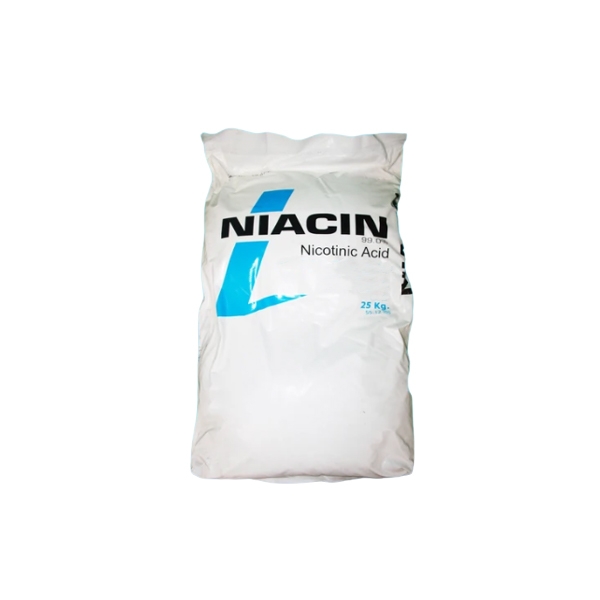


No products in the cart.
Vitamin B3, also known as niacin or nicotinamide, is a water-soluble B-complex vitamin. It plays an essential role in cellular energy metabolism and contributes to the normal functioning of the nervous system. Here's some information on vitamin B3:
Functions and uses :
Food Sources :
Niacin occurs naturally in a variety of foods, including meat, fish, nuts, seeds, green vegetables, and some fortified grain products.
Forms:
Niacin is available in several forms, including nicotinamide (niacinamide) and nicotinic acid. These forms can be used for different applications, including dietary supplements and skin care products.IN
Vitamin B3, also known as niacin or nicotinamide, is a water-soluble B-complex vitamin. It plays an essential role in cellular energy metabolism and contributes to the normal functioning of the nervous system. Here's some information on vitamin B3:
Niacin occurs naturally in a variety of foods, including meat, fish, nuts, seeds, green vegetables, and some fortified grain products.
Forms :
Niacin is available in several forms, including nicotinamide (niacinamide) and nicotinic acid. These forms can be used for different applications, including dietary supplements and skin care products.
Deficiency:
Niacin deficiency can lead to a disease called pellagra, characterized by symptoms such as skin problems, gastrointestinal disorders and nervous disorders.
Niacin is an essential vitamin that plays a vital role in many
Deficiency:
Niacin deficiency can lead to a disease called pellagra, characterized by symptoms such as skin problems, gastrointestinal disorders and nervous disorders.
Niacin is an essential vitamin that plays a vital role in many bodily functions. It is important to obtain sufficient niacin through a balanced diet to maintain good health. If supplements are required, it is advisable to consult a healthcare professional to determine the right dose.
Description: Nicotinic acid: minimum 99.0% activity.
Properties: Nicotinic acid, also known as niacin, niacinamide or vitamin B3, exerts its principal biological actions through its role in the enzymatic system of cellular respiration. It is involved in carbohydrate, lipid and protein metabolism. Nicotinic acid is an essential component in the diets of pigs, poultry and other non-ruminant animals.
Requirements: In many species, there is no simple nicotinic acid deficiency, as deficiency occurs when the intake of nicotinic acid and tryptophan is inadequate. The following factors influence the nicotinic acid requirements of farm animals:
Requirements: In many species, there is no simple nicotinic acid deficiency, as deficiency occurs when nicotinic acid and tryptophan intake are inadequate.
The following factors influence the nicotinic acid requirements of farm animals:genetic differences, the ability to synthesize it from tryptophan, increased stress and suffering due to subclinical diseases, intensification of production systems, early weaning, the presence of fungi and antimetabolites in feed and the type of carbohydrates consumed.
Target species: Poultry, pigs and ruminants.
Administration and dose: Powder product to be administered mixed with feed, according to the doses recommended in the following table:
Data sheet